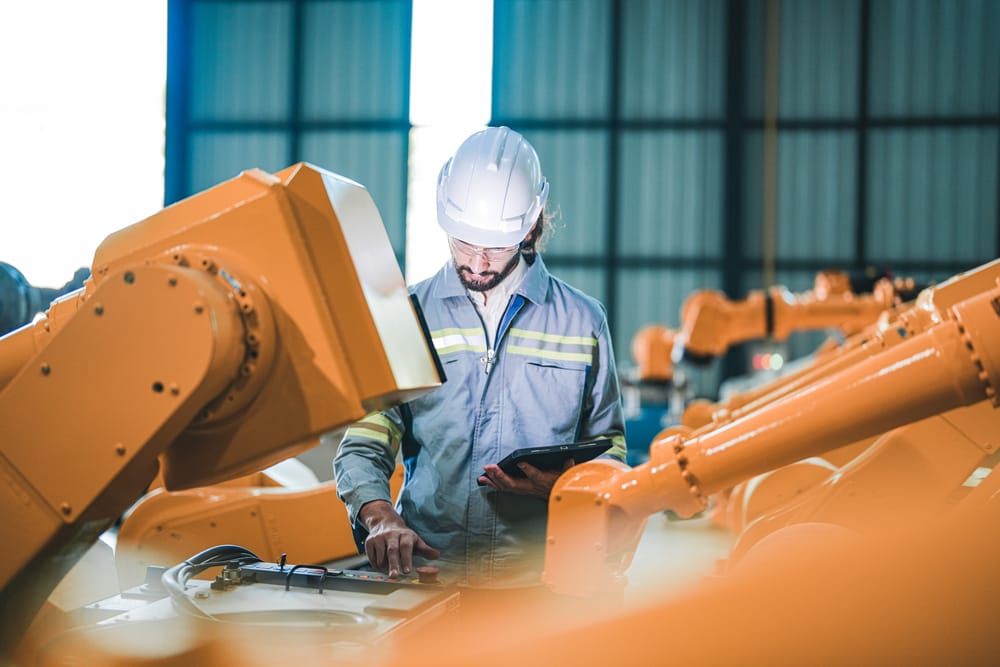Industrial artificial intelligence is reshaping businesses by embedding AI-driven automation directly into operational processes. Unlike traditional AI, which focuses on general-purpose tasks, crowdsourced models and online information, Industrial AI is designed to meet the specific demands of a delimited industrial environment.
Its ability to enhance automation, optimise predictive maintenance and support real-time decision-making makes it a game changer for businesses seeking to boost efficiency and reduce costs.
In this article, Inauro Co-CEO & Co-Founder Craig Kesby and Chief Commercial Officer Max Girault discuss the unique advantages of Industrial AI, how it differs from conventional AI applications, and how Inauro’s AI-powered Perspio™ platform enables seamless integration, unlocking new levels of operational performance and efficiency.
What is Industrial AI?
More and more businesses are using Industrial AI to enhance decision-making, automate repetitive tasks and analyse vast amounts of data to generate insights. AI-powered applications allow businesses to increase efficiency, reduce costs and improve customer experiences. So, what is Industrial AI, and does your business need it?
“Industrial AI is distinct from generative AI (like chatbots or GPTs) because it deals with internal business data rather than a vast, open-source dataset like the web,” says Max. “In industry, AI provides a generative component but also facilitates decision-making and triggers actions across various systems.”
It’s something Inauro has plenty of experience with. “Industrial AI helps businesses interact with their data in a non-technical way,” adds Craig. “The foundational component involves aggregating data from various machines and systems to make it easier for people in different roles to extract useful insights in their own business-specific language.”
How does Industrial AI work?
The AI automation of complex manual processes is one of the most exciting developments of AI-powered technology in industry. Industrial AI applications can process large amounts of data from IoT devices and systems in real-time, then autonomously analyse the data, learning from it and making decisions or triggering actions. This helps streamline operations and reduces the need for manual oversight.


AI enhances construction by automating equipment monitoring, predicting maintenance needs and streamlining procurement to boost safety and productivity.
Key AI industry applications of Industrial AI
Using an AI-powered Operational IoT platform like Inauro’s Perspio™, organisations across various industries can collect and integrate data from multiple sources to gain real-time insights to improve operational efficiency and reduce downtime of assets and equipment. Here are some examples:
Equipment rental: “Industrial AI technology can assist hire coordinators by automating actions like putting assets on hire or off hire, replacing assets due for service and supporting decision-making for administrative tasks,” says Max. “The goal is to progressively mature from prompting humans to fully automating these decisions.”
Logistics and fleet management: AI prevents logistical errors, such as dispatching the wrong item. “The system can identify incorrect asset selection and trigger alerts before incorrect equipment leaves a facility,” says Max. “This involves using technologies like geofencing, integration with ERP systems, and contracts to ensure the correct logistics actions are carried out.”
Construction: AI in construction improves efficiency through automated equipment monitoring, enabling predictive maintenance and reducing downtime. Fault detection systems identify issues as they happen, enhancing safety and preventing costly errors. AI also streamlines procurement, predicting material needs and automating supplier interactions to keep projects on track and within budget. These technologies reduce manual oversight and boost overall productivity.
Manufacturing: AI is used for predictive maintenance, anticipating equipment failures to reduce downtime and repair costs. It enhances quality control by automatically detecting defects during production, ensuring higher product standards. AI also improves supply chain optimisation by forecasting demand, managing inventory, and streamlining logistics, helping manufacturers operate more efficiently and respond quickly to changes in demand.
“Whatever the industry, Industrial AI can facilitate tasks and notify personnel to take action,” says Craig. “This capability simplifies processes, making it easier for staff to interact with the system in their own language rather than through complex or time-consuming workflows.”


AI-powered systems prevent logistical errors by identifying incorrect asset selection and triggering alerts before dispatch.
Adopting Industrial AI
Max and Craig highlight the main business benefits of adopting Industrial AI technologies.
- Human errors can lead to costly reworks, lost time and operational inefficiencies. Industrial AI helps mitigate human errors by ensuring the right equipment is used, the correct process is followed, or the asset is delivered the first time, avoiding unnecessary costs and delays.
- Industrial AI enables easier access to data through natural language inputs and outputs, allowing more people in a business to interact with data in a straightforward manner. This reduces dependency on technical specialists and leads to faster and more efficient decision-making.
- Instead of waiting weeks for a technical expert to process and analyse data, Industrial AI provides timely insights and suggests or takes actions directly. This immediate response helps improve efficiency and ensures a business can react when it matters most.
- Initial suggestions from AI can evolve into automated tasks. Over time, an Industrial AI system can suggest improvements, create tickets or even automate entire processes.
- Industrial AI can support continuous improvement initiatives by collecting real-time data, performing timely analyses and feeding actionable insights back into the systems employees are already familiar with.
Inauro: your partner in Industrial AI automation
To successfully implement Industrial AI, it’s essential to maintain the integrity of your existing data, ensure all operational devices are functioning optimally, and have a robust technological infrastructure in place. Seamless integration with your existing systems is critical – and that’s where we can help.
At Inauro, we’re pioneering Industrial AI by leveraging our expertise to seamlessly integrate AI into existing workflows, transforming how our clients’ businesses operate. Our approach bridges gaps between operational data and actionable insights, enabling smoother decision-making processes.
A key to this is our Perspio™ platform, which enhances automation by bringing together data from different sources and using the power of AI to trigger actions across systems. This allows businesses to automate tasks, reduce manual errors and improve efficiency without disrupting their established operations.
Get in touch today to find out what Industrial AI and Inauro can do for you.

